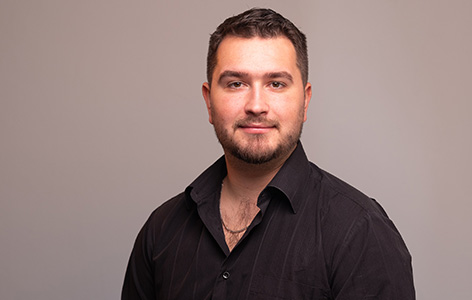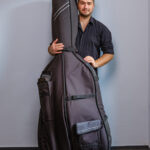
E3 Young Soloists II
The concert will offer a varied program full of virtuosity and poetry. Ravel’s Rhapsody Gypsy, inspired by Romani music, is a celebration of violin brilliance. Frank Proto’s Nine Variations on Paganini for double bass and orchestra combines a famous theme with jazz lightness. Debussy’s Afternoon of a Faun will transport the listener to a dreamlike world of impressionistic moods. The finale will be the lyrical but technically demanding Violin Concerto by Samuel Barber.
Maurice Ravel
Tzigane, concert rhapsody for violin and orchestra, M. 76a
Frank Proto
Nine Variations on Paganini for Double Bass and Orchestra
Claude Debussy
Prélude à l’après-midi d’un faune (Prelude to the Afternoon of a Faun), L. 86
Samuel Barber
Concerto for Violin and Orchestra, Op. 14
David Hernych – violin
Ondřej Sejkora – double bass
Jiří Vodička – violin
Anna Bangoura – moderation
Janáček Philharmonic Ostrava
Robert Kružík – conductor
Maurice Ravel’s Tzigane, a concert rhapsody for violin and orchestra, is a true test of any performer’s technical skill and virtuosity. Ravel composed the work in 1924 for Hungarian violinist Jelly d’Arányi, who had introduced him to the passionate traditional music of Eastern European Romani bands.
Contemporary American composer and double bassist Frank Proto spent many years with the Cincinnati Symphony Orchestra, but also collaborated with jazz legends such as Dave Brubeck, Duke Ellington, and Gerry Mulligan. In his Nine Variations on Paganini for Double Bass and Orchestra from 2001, Proto dresses Paganini’s famous 24th Caprice in a lively jazz style.
Claude Debussy’s iconic orchestral work Prélude à l’après-midi d’un faune (Prelude to the Afternoon of a Faun), composed in 1894, was inspired by a poem by Stéphane Mallarmé. Through classical mythology, Mallarmé evokes fleeting and dreamlike sensual impressions.
Samuel Barber’s Violin Concerto is not a showy or flashy work, but rather a lyrical and contemplative piece, unfolding in the intimate atmosphere of a small orchestra. However, this does not mean that it makes any fewer technical demands on the soloist.
The concerto was premiered in 1941 by violinist Albert Spalding with the renowned Philadelphia Orchestra under the baton of Eugene Ormandy.



